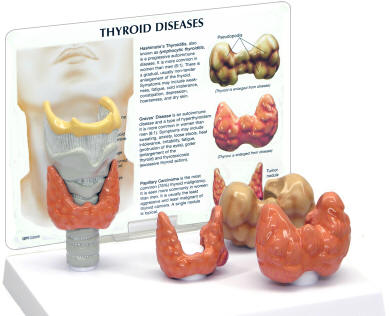A common mutation associated with thyroid cancer did not predict an unfavorable prognosis and had no consistent association with adverse characteristics, a review of patient records showed.
The BRAF V600E mutation had significant associations with positive tumor margins and lymph node involvement in a univariate analysis but did not remain significant by multivariate analysis.
The mutation was associated with male sex, total thyroidectomy, and adverse follicular variant papillary thyroid cancer (PTC) but not with any other clinicopathologic features, Lisa A. Orloff, MD, of the University of California San Francisco, and co-authors reported online in JAMA Otolaryngology-Head and Neck Surgery.
“BRAF V600E mutation has been extensively studied in relation to negative prognostic indicators in PTC, with no consistent relationship emerging,” the authors concluded.
“Two recent meta-analyses showed an overall association between BRAF status and aggressive disease features and called for tailoring treatment plans in patients accordingly. In this, the largest U.S. study to date, BRAF status was not significantly associated with most clinicopathologic features suggestive of more aggressive disease.”
PTC accounts for almost 90% of all thyroid malignancies. Multiple individual studies have shown associations between BRAF V600E mutations and negative prognostic clinicopathologic features of PTC, as well as increased overall mortality. However, other studies have shown no such associations. BRAF V600E also plays a prominent role in melanoma.
 Recently, two meta-analyses reinforced negative associations from individual investigations, showing associations between BRAF V600E and extrathyroidal extension, lymph node metastasis, advanced stage, and recurrent disease.
Recently, two meta-analyses reinforced negative associations from individual investigations, showing associations between BRAF V600E and extrathyroidal extension, lymph node metastasis, advanced stage, and recurrent disease.
A common mutation (BRAF V600E) associated with thyroid cancer did not predict an unfavorable prognosis and had no consistent association with adverse characteristics.
Note that BRAF mutation had a significant association with classic-type papillary thyroid carcinoma as opposed to follicular variant or other less-common subtypes and positive tumor margins, as well as a trend toward extrathyroidal extension.
Despite inconsistencies, the overall weight of evidence support the consensus that BRAF mutation is a negative prognostic indicator in PTC, the authors said in their introduction.
To add to the knowledge base, Orloff and colleagues retrospectively reviewed records of patients with PTC treated by partial or total thyroidectomy with or without lymph node sampling at their institution from 2009 to 2012.
The study population comprised 429 patients, whose tumor specimens were tested for BRAF mutations. Investigators found that 314 (73.2%) of tested tumors tested positive for mutation.
Comparison of results with demographic data for the patients showed no association between BRAF status and age but confirmed precious observation of male predominance (OR 3.2, 95% CI 1.4-7.2 versus females). Total thyroidectomy also was significantly associated with BRAF mutation (OR 2.6, 95% CI 1.1-6.2).
BRAF mutation had a significant association with classic-type PTC as opposed to follicular variant or other less-common subtypes (P<0.001) and positive tumor margins (P=0.03), as well as a trend toward extrathyroidal extension (P=0.06). Follicular variant was associated with negative BRAF status (OR 0.1, 95% 0.1-0.4).
Lymph node metastasis was associated with BRAF mutation in a univariate analysis but not multivariate analysis (OR 1.4, 95% CI 0.7-2.6). BRAF mutation had no association with tumor multicentricity, lymphovascular invasion, tumor stage, or extranodal extension.
"The significance of BRAF mutation in the management of PTC remains unclear," the authors said of their findings.
They cited several potential explanations for the difference between their findings and those of previous studies: large patient sample, high proportion of BRAF-positive tumors, and limited geographic representation of the population.
"If anything, the absence of BRAF mutation may prove to be a favorable prognostic indicator and a basis for deescalation of therapy, such as more selective use of radioactive iodine or lymph node dissection in patients with PTC," the authors concluded. "Such data have not yet been adequately studied.
"Certainly, efforts to recommend more aggressive initial therapies to BRAF-positive patients with PTC should be tempered until more long-term data related to outcome are available."
The study had no outside sources of funding.
The authors reported no relevant disclosures.
###
By
Charles Bankhead, Staff Writer, MedPage Today
Provided by ArmMed Media
 Recently, two meta-analyses reinforced negative associations from individual investigations, showing associations between BRAF V600E and extrathyroidal extension, lymph node metastasis, advanced stage, and recurrent disease.
Recently, two meta-analyses reinforced negative associations from individual investigations, showing associations between BRAF V600E and extrathyroidal extension, lymph node metastasis, advanced stage, and recurrent disease.